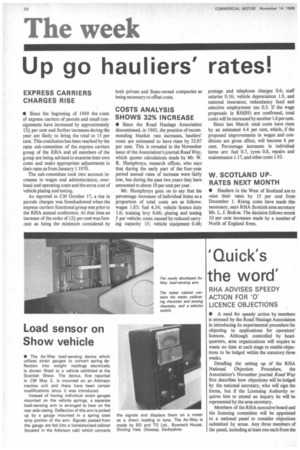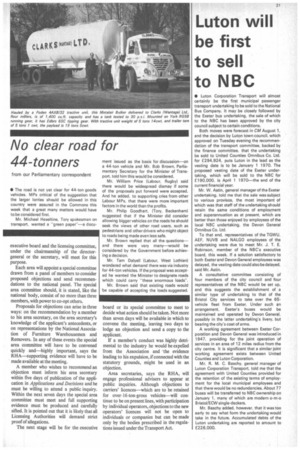'Quick's the word'
Page 22

Page 23

If you've noticed an error in this article please click here to report it so we can fix it.
RHA ADVISES SPEEDY ACTION FOR '0' LICENCE OBJECTIONS
O A need for speedy action by members is stressed by the Road Haulage Association in introducing its experimental procedure for objecting to applications for operators' licences. Although controlled by headquarters, area organizations will require to waste no time at each stage to enable objections to be lodged within the statutory three weeks.
Detailing the setting up of the RHA National Objection Procedure, the Association's November journal Road Way first describes how objections will be lodged by the national secretary, who will sign the forms, but if the Licensing Authority requires him to attend an inquiry he will be represented by the area secretary.
Members of the RHA executive board and the licensing committee will be appointed to a national panel to consider objections submitted by areas. Any three members of the panel, including at least one each from the executive board and the licensing committee, under the chairmanship of the directorgeneral or the secretary, will meet for this purpose.
Each area will appoint a special committee drawn from a panel of members to consider proposed objections and send recommendations to the national panel. The special area committee should, it is stated, like the national body, consist of no more than three members, with power to co-opt others.
Proposals for objections can arise in three ways: on the recommendation by a member to his area secretary, on the area secretary's knowledge of the applicant's antecedents, or on representations by the National Association of Furniture Warehousemen and Removers. In any of these events the special area committee will have to be convened quickly and—highly important, says the RHA—supporting evidence will have to be made available at the meeting.
A member who wishes to recommend an objection must inform his area secretary within five days of publication of the application in Applications and Decisions and he must be willing to attend a public inquiry. Within the next seven days the special area committee must meet and full supporting evidence must be produced and carefully sifted_ It is pointed out that it is likely that all Licensing Authorities will demand strict proof of allegations.
The next stage will be for the executive board or its special committee to meet to decide what action should be taken. Not more than seven days will be available in which to convene the meeting, leaving two days to lodge an objection and send a copy to the applicant.
If a member's conduct was highly detrimental to the industry he would be expelled from the Association and 'the evidence leading to his expulsion, if connected with the statutory grounds, might be used in an objection.
Area secretaries, says the RHA, will engage professional advisers to appear at public inquiries. Although objections to carriers' licences—which are to be retained for over-16-ton-gross vehicles—will continue to be on present lines, with participation by individual operators, objections to the new operators' licences will not be open to individuals or companies but can be made only by the bodies prescribed in the regulations issued under the Transport Act.




















































































































